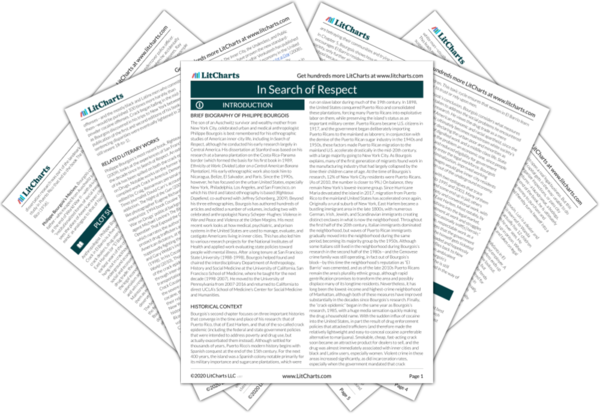FIRE Sector Quotes in In Search of Respect
To summarize, New York-born Puerto Ricans are the descendants of an uprooted people in the midst of a marathon sprint through economic history. In diverse permutations, over the past two or three generations their parents and grandparents went: (1) from semisubsistence peasants on private hillside plots or local haciendas; (2) to agricultural laborers on foreign-owned, capital-intensive agro-export plantations; (3) to factory workers in export-platform shantytowns; (4) to sweatshop workers in ghetto tenements; (5) to service sector employees in high-rise inner-city housing projects; (6) to underground economy entrepreneurs on the street. Primo captured the pathos of these macrostructural dislocations when I asked him why he sometimes called himself a jíbaro:
Primo: My father was a factory worker. It says so on my birth certificate, but he came to New York as a sugarcane cutter. Shit! I don’t care; fuck it! I ’m just a jíbaro. I speak jíbaro Spanish. Hablo como jíbaro [I speak like a jíbaro].
It almost appears as if Caesar, Primo, and Willie were caught in a time warp during their teenage years. Their macho-proletarian dream of working an eight-hour shift plus overtime throughout their adult lives at a rugged slot in a unionized shop has been replaced by the nightmare of poorly paid, highly feminized, office-support service work. The stable factory-worker incomes that might have allowed Caesar and Primo to support families have largely disappeared from the inner city. Perhaps if their social network had not been confined to the weakest sector of manufacturing in a period of rapid job loss, their teenage working-class dreams might have stabilized them for long enough to enable them to adapt to the restructuring of the local economy. Instead, they find themselves propelled headlong into an explosive confrontation between their sense of cultural dignity versus the humiliating interpersonal subordination of service work.












